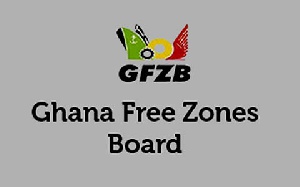The Ghana Free Zones Board (GFZB) is in discussion with two commercial banks in the country to set up off shore banking operations to serve the many companies operating as Free Zone enterprises in the country.
Michael Okyere Baafi, Executive Secretary of the GFZB said : "The Board is talking to two (2) Banks in the country to set up an offshore bank operating as a Free Zone entity. This would be done with special emphasis on the Bank of Ghana's regulations.
This would allow flexible transactions and to facilitate in managing investors financial commitments and also allow investors to freely import as well as export funds provided it will not contradict the GFZB and Bank of Ghana regulations."
Offshore banks are used for a variety of purposes. They may be formed as a subsidiary of a domestic or international bank to accept deposits outside the controlled environment, particularly foreign currency deposits.
Typically an offshore bank is a bank located outside the country of residence of its depositors, with most of its account holders being non-residents of the jurisdiction.
Individuals or companies will maintain an offshore account in a low-tax jurisdiction that provides financial and legal advantages, such as greater privacy, little or no taxation, easy access to deposits, and protection against local, political, or financial instability.
The Government of Ghana introduced the concept of offshore banking as a key aspect of its financial sector development strategy, with a view to making Ghana a gateway to financial services in West Africa and linking the Ghanaian economy to global markets.
Parliament in 2007 passed an amendment to the banking Act, 2004 (Act 673) paving the way for the establishment of offshore banking in Ghana and eventually other offshore financial services like insurance and leasing.
The specific focus of the proposed Ghana's International Financial Service Centre was to be a regional hub for financial activities in Africa and to attract Diaspora investments. Â However, offshore banking is still yet to take off fully in Ghana.
The Free Zones Concept
Ghana's Free Zones Programme is designed to promote processing and manufacturing of goods through the establishment of Export Processing Zones (EPZs), and, encourage the development of commercial and service activities at sea and airport areas.
Entities operating as Free Zones are not subject to the regular tax regime, enjoy a 10-year tax holiday, and are expected to export 70 percent of all products to help the country bridge its balance of trade deficit, create jobs, and lead to transfer of skills to indigenes.
Mr. Baafi noted that: "The strategy of the Board is to change the face of GFZB in the eyes of our valued investors and market Ghana as a destination of choice for investments that have the potential to generate exports.
To achieve this objective, the Board intends to change the image of the secretariat in myriad of ways among some of which are to purposefully open several independent offices across the country which would carry out the same functions for the secretariat. Branches would be opened in Kumasi and Tamale to accommodate investment projects around these areas."
He added that: "A good reason is to give our investors the opportunity to gain access to different geographic markets, where our physical presence is necessary for them to do so.
Another reason is to meet our clients needs. FZEs across the country travel far and wide to seek our services. The proximity of these offices would make it accessible for companies around those regions to operate freely."
Business News of Thursday, 20 July 2017
Source: thebftonline.com
Free Zones baits 2 banks into off shore operations
Entertainment












